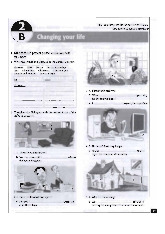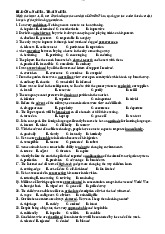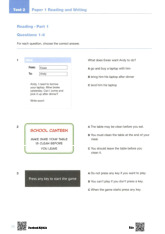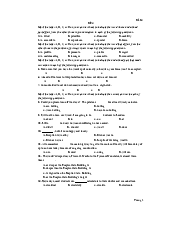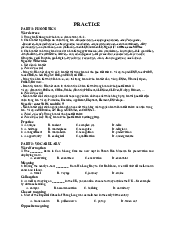












Preview text:
PRACTICE TEST 17 A. LISTENING (5.0 points):
Part 1. Complete the form below using NO MORE THAN ONE WORD AND/OR A
NUMBER for each answer. Write your answers in the space provided (1.0pt) Hotel Reservation
Four-bed room available in (1) ______________ Room price:
in high season: (2) €______________
cheaper if you booked (3) ______________
Meal included in price: (4) ______________
Must bring your own (5) ______________ Hotel facilities:
a lounge with a variety of books games room Internet Activities available: collect shells hire bicycles
Part 2: You will hear a television news report about stress. For questions 6-105, decide
whether the following statements are true (T) or false (F). Write your answers in the
corresponding numbered boxes provided (1.0pt)
6. Canadians have less stress than Americans.
7. The most common sources of stress are jobs and money.
8. Only the richest members of society experience stress.
9. Mexico had the lowest rate of stress in the survey.
10. France is a stress-free country to live in. Your answers: 6. 7. 8. 9. 10.
Part 3. You will hear an interview with a sports writer about football referees. Listen
carefully and choose the correct answer A, B or C for each question. Write your answers in the
corresponding numbered boxes. (1.0 pt)
11. Martin says that referees become concerned if
A. they are no longer chosen for important matches.
B. they cease to cause strong reactions.
C. they feel that other referees do not regard them highly.
D. they attract a lot of attention from strangers. 1
12. Martin says that referees think they gain the respect of players by
A. resorting to strict disciplines when it is necessary.
B. adopting different approaches with different players.
C. showing that they do not care what players think of them.
D. treating players with a certain amount of tolerance.
13. According to Martin, it would be wrong to believe that referees
A. are not passionately interested in football.
B. do not feel that they are performing a duty.
C. are largely motivated by their own vanity.
D. are poorly paid for their efforts.
14. What does Martin say about the system for assessing referees?
A. It causes some referees to be indecisive.
B. It requires referees not to be sensitive people.
C. It enables poor referees to be identified quickly.
D. It leads to inconsistencies in referees’ decisions.
15. Martin says that a referee should deal with the bad behavior of players by
A. informing them that they cannot influencehis decisions.
B. admitting to them when they has made a mistake underpressure.
C. deciding rapidly what a player’s real intention was.
D. treating the worst offences with the greatest severity. Your answers: 11. 12. 13. 14. 15.
Part 4: You will hear a man called Neil Brown giving a talk about cycling. Complete the
sentences by writing NO MORE THAN THREE WORDS AND/OR A NUMBER for each
answer. Write your answers in the space provided. (2.0pts)
The Cycle Campaign Network promotes cycling as a (16) ______________________, a
sport, and a means of transport.
Cycling helps reduce pollution caused by (17) ______________________ from cars and also traffic noise.
Local authorities are starting to emphasize (18) ______________________ by developing special cycle routes.
Cycling is now being taught at a number of (19) ______________________.
However, if the project is to develop, (20) ______________________ will be needed.
A regimen of regular cycling can prevent (21) ______________________ disease and strokes.
It also makes your body better able to recover from (22) ______________________.
Neil suggests that an individual’s (23) ______________________ may be enhanced by cycling to work.
The majority of organized cycling events are (24) ______________________ to anone wishing to take part. 2
Some organizations participate in Bike Week to promote cycling and (25)
______________________ for charity. B. LEXICO- GRAMMAR (5.0pts)
Part 1. Choose the best option A, B, C, or D to complete the following sentences and
write your answers in the corresponding numbered boxes. (2.0 pts)
1. My older brother is extremely fond of astronomy, he seems to ________ a lot of pressure from observing the stars. A.derive B. possess C. seize D. reach
2. News items are ________ to a stringent process of selection. A.determined B. subject C. reliant D. dependent
3. Hardly a single old building ________ standing after the council remodeled the town. A. remained B. stayed C. kept D. continued
4. She went under ________ as a waitress to write an article on tipping. A.mask B. act C. pose D. cover
5. Don’t live on the main road unless you have good ________ against noise. A. insurance B. isolation C. insulation D. assurance
6. I had absolutely no ________ of the conversation you refer to. A. reminiscence B. reminder C. recollection D. recall
7. She’s more interested in job ________ than in making a lot of money. A. contentment B. satisfaction C. enjoyment D. pleasure
8. I don’t want lots of excuses; I just want to hear the ________ truth. A. plain B. clear C. pure D. right
9. This dog has been maltreated but I find it very ________ to kindness. A. answerable B. responsible C. reactive D. responsive
10. He didn’t have a ________ of evidence to support his claims. A. sign B. scrap C. sense D. state
11. It is physically impossible for any human being to ________ such extreme cold for long. A. persit B. withhold C. endure D. last
12. It is his versatility that ________ him apart from other actors of his generation. A. puts B. makes C. sends D. sets
13. The grant will be paid in three equal ________ over the course of the year. A. occurences B. episodes C. instalments D. inversions
14. Tom said something rude and a big argument ________ A. ensued B. derived C. stemmed D. sprang
15. Marketing this new product will be expensive, but ________ it will be worth the money we spend on it. A. at long last B. in the long run C. in the event D. down the years
16. Don’t count on Patrick; he is liable to ________ if things get too difficult. A. let up B. make off C. opt out D. pass out
17.It was so embarrassing. We were in the middle of a crowded restaurant when they suddenly had a ____________ row. A. blazing B. heated C. stormy D. smouldering
18. Fresh fruit juice is better for you than ____________ drinks. A. fuzzy B. fizzy C. saccharine D. bubbly
19. There she was, walking out of customs, ____________ a huge suitcase behind her. A. towing B. manhandling C. pushing D. dragging 3
20. Everybody was busy with the spring cleaning, except Stanley, who always refused to pull his____________. A. socks B. weight C. fingers D. share Your answers: 1. 2. 3. 4. 5. 6. 7. 8. 9. 10. 11. 12. 13. 14. 15. 16. 17. 18. 19. 20.
Think of ONE word which can be used appropriately in all three sentences. Write your
answers in the correspondent numbered blanks. (1.0pt) 1._________ 2. __________ 3. __________ 4. __________ 5._________
Part 2: The passage below contains 10 mistakes. Identify the mistakes and write the
corrections in the corresponded numbered boxes. (1.0pt) Line Passage 4 1
Although air-conditioning has led to economical improvement and has increased daily 2
comfort with people everywhere, its impact on the environment has not been so 3
positively. First, air-conditioning units release polluting chemicals onto the air, that
contribute to global warming. Furthermore, running air-conditioning on a large scale 4
requires enomous amount of energy. The burning of coal and oil to produce this energy 5
also contributes to air pollution and thus, to global warming. According to experts, 6
global warming could result from dramatic changes in climate, rising ocean levels, and 7
more violence storms in the years to come. 8
In some countries, governments and industry are beginning to search for ways to 9
reduce the harm caused by air-conditioning. In Japan, summer temperatures have been
risen in office buildings to conserve energy. In the United States, government, 10
industry, and private groups are searching for ways to reduce the amount of dangerous 11
chemicals released by air conditioners, especially those in cars and trucks. Stay cool is 12
important, and many cannot imagine life without air-conditionig. But in the future, we 13
will have to finding new technologies to make sure that air-conditioning does not 14
create more problems than it solves. Your answers: Line Mistakes Correction 1 2 3 4 5 6 7 8 9 10
Part 3: Complete each sentence with one suitable particle or preposition. Write your
answers in the corresponding numbered boxes provided. (1.0pt)
1. That’s the third break-in this month. We must tighten __________ security to prevent any more.
2. The fireworks exploded in all their colours and lit __________ the sky.
3. The teacher asked the pupils who had broken the chair, but at first no one owned__________.
4. I can see no basis __________ changing our plans now.
5. He’s a good speaker and gets his views __________ very well.
6. This ugly furniture does not do justice__________ this magnificent house.
7. The changes were phased __________ gradually so that everyone could get used to them.
8. Certain artists seem to be conforming __________ the current fashion for installation.
9. It was a deep wound so it took some time to heal __________.
10. He had a great talent __________ singing, and decided to become an opera singer. 5 Your answers: 1. 2. 3. 4. 5. 6. 7. 8. 9. 10.
Part 4: Give the correct form of each bracketed word in the following passage. Write your
answers in the corresponding numbered boxes. (1.0pt)
Almost without (0) exception, when a little boy starts to cry, he’s EXCEPT
told to put a brave face on it. “Boys don’t cry!” is the familiar
(1)_______________, and with this, we exert enormous pressure on EXCLAIM
our sons to hid their emotions. Girls are almost (2)_______________ expected to express their feelings, but it would be VARY
(3)_______________ to believe that they are born weaker, more ERROR
sensitive or with a greater natural (4)_______________ to cry. Boys INCLINE have feelings too.
According to several leading psychiatrists, boys are more vulnerable
to psychological and other problems later in life. Social pressures on
them to be “touch” can affect their (5)_______________ ACADEMY
performance, and even lead to antisocial behaviour. This, in turn, can
manifest itself in acts of violence and (6)_______________. It is RECKLESS
even suspected that the (7)_______________ higher rate of suicide SIGNIFICANCE
among young men is a result of boys being unable to “get it off their
chest”, as compared to girls and women, who confide more
(8)_______________ in others and are more likely to seek READY
professional help if they are emotionally distressed.
What boys realy need is more encouragement in their
(9)_______________ years in order not to succumb to feelings of
depression later on. This will help them to become more mature FORM
emotionally and it may even lead to a reduction in juvenile
(10)_______________ among young males. DELINQUENT Your answers: 1. 2. 3. 4. 5. 6. 7. 8. 9. 10. C. READING (5.0pts)
Part 1. Read the following passage and decide which answer (A, B, C, or D) best fits
each gap. Write your answers in corresponding numbered boxes. (1.0 pt) ART THERAPY
Early psychologists regarded their patient’s dreams as the work of the subconscious, and,
recognizing that dreams consist almost entirely of visual images, they discussed what they might
(1)____________. One drawback of traditional therapy is the problem of translating these images
into words. Art therapy gets around this problem by having patients produce paintings, drawings
or sculptures to make their innermost thoughts (2)____________. The process of creation itself
may bring (3)____________ benefits for the participants, as it is a safe way to express strong and
sometimes destructive feelings. Simply making something helps (4)____________ self-
confidence to those with low self-esteem. The finished product is not important, but the therapist
may choose to (5)____________ the session with a discussion of the significance of what the 6
patient (or client) has made. Art therapists need to be highly trained because they often work with
people with (6)____________ problems. It is a particular (7)____________ way to help children
deal with trauma or loss because they generally find it easier to express themselves through
(8)____________ than through words. Art therapy is a fast-growing field because its techniques
are (9)____________ not only in schools and clinics, but also in business-anywhere, in fact,
where people might benefit from (10)____________ themselves in a new light. 1.A.specialize B. pose C. demonstrate D. represent 2.A. visible B. diagonal C. credible D. digestible 3. A. light B. straight C. tangible D. bright 4. A. focus B. restore C. pick up D. brush up 5. A. follow up B. hang up C. go on D. light up 6. A. conceivable B. hypothetical C. psychologica D. hysterical 7. A. reasonable B. effective C. inventive D. achievable 8. A. lines B. spheres C. lights D. pictures 9. A. contemporary
B. knowledgeable C. applicable D. flexible 10. A, taking B. showing C. going D. seeing
Part 2: Read the text below and think of the word which best fits each space. Use only
ONE word in each space. Write your answers in the corresponding numbered boxes. (1.5 pts)
While most people (1)_________ to have a toned healthy body, not everyone enjoys
(2)_________ out at the gym. In fact, many of us would sooner avoid any kind of vigorous
exercise altogether, and may not even feel it is necessary. Over the years, various health experts
have assured us that keeping fit simply requires a total of 30 minutes of moderate activity most
days of the week. Many people believe that a walk to the shops or some light housework
constitutes moderate activity, but it turns (3)_________ this may not be the case.
According to the British Association of Sport and Exercise, it is high (4)_________ more
specific advice was given about what actually constitutes moderate activity. Housework, it seems,
does not fall into this category. Annyone who devotes a great deal of time everyday to dusting
and vacuuming no doubt wishes that it did, but reseach has shown that women who spend over
eight hours a day (5)_________ housework actually tend to be slightly more overweight than
(6)_________who do none whatsoever. The association, therefore, would prefer it if the public
were instructed as to exactly what (7)_________ of physical activity to aim for.
But setting such guidelines is not easy (8)_________ individual fitness levels and exercise
requirements vary. For instance, while walking at a fast pace (9)_________ generally beneficial
for women, it may not be physically challenging enough for men. For this reason, the association
would rather this section of the population took up jogging (10)_________ relied on walking as a form of exercise. Your answers: 1. 2. 3. 4. 5. 6. 7. 8. 9. 10.
Part 3. Read the following passage and choose the best answer to each of the following
questions. Write your answers in corresponding numbered boxes. (1.0pt) Forgetful brains 7
Humans have always had trouble remembering certain details. One person has the unique
experience of recalling in almost exact detail a memory from his childhood, but he cannot
remember what he ate for lunch yesterday. Another cannot recall names of people she met five
minutes ago, but she remembers the names of people she met from an hour before. Psychologists
have searched for answers to the memory phenomenon to better understand how the brain
functions and what triggers memory or causes forgetfulness. After extensive research over the
past century, they have come up with basic theories to help explain memory loss.
There are times when an individual loses all recollection of an event. This is referred to as
the decay theory, which states that if memories are not recalled from time to time, they fade and
then gradually drop from a person’s memory. Decay is proven to occur with sensory memories,
or short-term memories, if they are not recalled or rehearsed. Decay of long term memory is
harder to explain because these memories last through the passage of time. However, the age of
the memory does not enable psychologists to predict which memories will disappear and which
will remain. In fact, some knowledge can be accessed many years after it is first learned.
Research on students who took Spanish courses in high school even though they had hardly used
the language. While some memories tend to decay, others remain burned into the recesses of the
brain, causing psychologists to further ponder the workings of memory.
Another explanation made by researchers concerning memory loss is known as
interference. Under this theory, an individual forgets a memory when similar information enters
the mind and interferes with the original memory in either the storage or retrieval area of the
brain. The information is somewhere in the person’s memory, but it gets confused with other
details. This occurs in both short-term and long term memory and is most common when a person
tries to recall isolated facts. For instance, a woman goes to a party and meets a man named Joe at
the front door. Half an hour later, she is introduced to Jason. When she sees Joe again, she
accidentally calls him Jason. This is retroactive interference. The newest information input
replaces the old information, causing the woman to mistakenly call the first man by the wrong
name. Additionally, people may suffer from proactive interference. A new student meets his first
professor, Dr. Mack, in frequently calls both teachers Dr. Mack, since that is the first name he
had learned. Remembering the first set of information and not remembering the next is proactive
interference. The old information interfered with the student’s ability to recall the newer information.
When a person needs to remember something, he frequently relies on cues, or reminders,
to help him retrieve a specific memory. When he lacks the cues to recall the memory, the person
suffers from cue-dependent forgetting. This may be the most common type of forgetfulness.
Psychologist Willem Wagenaar did a year-long study during which he recorded events from his
life daily. After a year’s time, he could not remember twenty percent of the critical details, and
after five years, he had forgotten sixty percent. However, he complied cues from ten witnesses to
recall pieces of information about all ten. Thus, when he had cues to help him to retrieve his
memories, he could remember his experiences, illustrating that he was somewhat cue-dependent.
Cognitive psychologists believe that these specific cues help direct a person to the area of the
brain where the memory is stored or they match up with information linked to the actual memory the person is seeking.
Whether forgetfulness is from years of decay, replacement of old memories, or lack of
cues, researchers continue working to locate the source of people’s forgetfulness. The answers are
becoming clearer with each additional study. As brain research advances, psychologists are sure
to connect many different factors that link people back to their memories.
1.The word triggers in paragraph 1 is closest in meaning to A.closes B. cues C. reviews D. erases 8
2. According to paragraph 2, decay of short-term memories can be avoided by A. remembering associations
B. removing immediate distractions
C. recollecting information often
D. taking time to acquire input
3. What can be inferred about the decay theory from paragraph 2?
A. Memories from big events always remain in the mind.
B. Memory decay arises from specific circumstances.
C. Recalling old memories prevent their decay.
D. Most people suffer from some degree of memory decay.
4. The word ponder in paragraph 2 is closest in meaning to? A. consider B. explain C. forget D. understand
5. All of the following are mentioned in paragraph 3 as interference EXCEPT
A. Confusing newly learned facts with other details
B. Confusing old memories with current situations
C. Remembering the first information but forgetting the second set
D. Recalling the last information acquired but losing the first
6. In paragraph 3, the author discusses remembering and forgetting names in order to
A. demonstrate memory interference
B. refute proactive and retroactive interference
C. advocate acquiring new memories
D. reveal the workings of forgetfulness
7. The word it in paragraph 3 refers to A. retrieval area B. information C. storage area D. memory
8. The word isolated in paragraph 3 is closest in meaning to A. complex B. angry C. remote D. ignored
9. According to paragraph 4, cue-dependent forgetting is defined as?
A. not being able to remember details or events when clues are present
B. not being able to remember details or events unless clues are present
C. not being able to forget clues about details or events
D. not being able to remember details or events without assistance from other people
10. Which of the following does not relate to the type of forgetting known as interference?
A. is characterized by either proactive or retroactive memories
B. occurs when trying to locate specific, isolated events
C. can be aided by reminders of past experiences
D. happens in the storage or retrieval area of the mind
Part 4. Read the following extract and answer do the tasks that follow. (1.5pts) THE FACE OF MODERN MAN?
A. In response to the emergence of the ‘metro-sexual’ male, In other words, an urban, sophisticated
man who is fashionable, well-groomed and unashamedly committed to ensuring his appearance is the
best it can be, a whole new industry has developed. According to research conducted on behalf of a
leading health and beauty retailer in the UK, the market for male cosmetics and related products has 9
grown by 800% since the year 2000 and is expected to continue to increase significantly. The male
grooming products market has become the fastest growing sector within the beauty and cosmetics
industry, currently equivalent to around 1.5 billion pounds per annum.
B. Over the last decade, a large number of brands and companies catering for enhancement of the
male image have been successfully established, such operations ranging from male-only spas,
boutiques, personal hygiene products, hair and skin care ranges, and male magazines with a strong
leaning towards men’s fashion. Jamie Cawley, proprietor of a successful chain of London-based
male grooming boutiques, holds that his company’s success in this highly competitive market can be
attributed to the ‘exclusivity’ tactics they have employed, in that their products and services are
clearly defined as male- orientated and distinctly separate to feminine products offered by other
organisations. However, market analyst, Kim Sawyer, believes that future growth in the market can
also be achieved through sale of unisex products marketed to both genders, this strategy becoming
increasingly easy to implement as men’s interest in appearance and grooming has become more of a social norm.
C. Traditionalists such as journalist Jim Howrard contend that the turn-around in male attitudes
which has led to the success of the industry w’ould have been inconceivable a decade ago, given the
conventional male role, psyche and obligation to exude masculinity; however, behavioural scientist
Professor Ruth Chesterton argues that the metro-sexual man of today is in fact a modern incarnation
of the ‘dandy’ of the late eighteenth and early nineteenth century. British dandies of that period, who
were often of middle class backgrounds but imitated aristocratic lifestyles, were devoted to
cultivation of their physical appearance, development of a refined demeanour and hedonistic
pursuits. In France, she adds, dandyism, in contrast, was also strongly linked to political ideology
and embraced by youths wishing to clearly define themselves from members of the working class
revolutionary social groups of the period.
D. Over recent decades, according to sociologist Ben Cameron, gender roles for both sexes have
become less defined. According to research, he says, achievement of status and success have become
less important in younger generations of men, as has the need to repress emotions. Cameron defines
the traditional masculine role within western societies – hegemonic masculinity – as an expectation
that males demonstrate physical strength and fitness, be decisive, self-assured, rational, successful
and in control. Meeting this list of criteria and avoiding situations of demonstrating weakness, being
overly emotional or in any way ’inferior’, he says, has placed a great deal of pressure on many
members of the male population. So restrictive can society’s pressure to behave in a ‘masculine’
fashion on males be, Professor Chesterton states that in many situations men may respond in a way
they deem acceptable to society, given their perceived gender role, rather than giving what they may
actually consider to be the best and most objective response.
E. Jim Howard says that learning and acquiring gender identity makes up a huge component of a
child’s socialisation and that a child who exhibits non-standard behavioural characteristics often
encounters social and self image difficulties due to the adverse reactions of their peers. According to
Kim Sawyer, media images and messages also add to pressures associated with the male image,
stating that even in these modern and changing times, hegemonic masculinity is often idolised and
portrayed as the definitive male persona. 10
F. Whilst male stereotypes and ideals vary from culture to culture, according to Professor Chesterton,
a universal trait in stereotypical male behaviour is an increased likelihood to take risks than is
generally found in female behaviour patterns. For this reason, she attributes such behaviour to the
influence of genetic predisposition as opposed to socially learned behaviour. Men, she says, are three
times more likely to die due to accident than females, a strong indication he says of their greater
willingness to involve themselves in precarious situations. Ben Cameron also says that an attitude of
invincibility is more dominant in males and is a predominant factor in the trend for fewer medical
checkups in males and late diagnosis of chronic and terminal illness than in their more cautious and vigilant female counterparts.
G. Jamie Cawley, however, remains optimistic that the metro-sexual culture will continue and that
what society accepts as the face of masculinity will continue to change. He attributes this to a male
revolt against the strict confines of gender roles, adding that such changes of attitudes have led and
will continue to lead to establishment of greater equality between the sexes.
The reading passage has seven paragraphs A-G. Choose the correct heading for
paragraphs B-G from the list of headings below.
Write the appropriate numbers (i-x) in corresponding numbered boxes in boxes 1-6. List of headings i. Basis and predictions ii. Revolution or recurrence?
iii. Servicing a growing demand
iv. The surfacing of a new phenomenon
v. A long -held mindset and its downsides vi. Influence on minors vii. Hereditary predilection
viii. Effects of external pressures 1 Paragraph B ___________ 2 Paragraph C ___________ 3 Paragraph D ___________ 4 Paragraph E ___________ 5 Paragraph F ___________ 6 Paragraph G ___________ Questions 7-10
Do the following statements agree with the views of the writer in Reading Passage? In boxes 7-10 write
YES if the statement agrees with the views of the writer
NO if the statement contradicts the views of the writer
NOT GIVEN if it is impossible to say what the writer thinks about this
7. Sales in the female health and beauty market have slightly declined over recent years.
8. The rise of ‘dandyism’ in England and France is attributed to similar factors. 11
9. Emotional reaction is contradictory to hegemonic masculine behaviour.
10. There is a correlation between men’s belief that they are indestructible and their decreased
likelihood to seek medical advice. Your answers: 1. 2. 3. 4. 5. 6. 7. 8. 9. 10. D. WRITING (5.0 pts)
Part 1. Finish each of the following sentences in such a way that it means exactly the
same as the sentence printed before it. There is an example at the beginning (0) (1.0pt)
(0): I haven’t seen him for two years
The last time __ I saw him was two years ago ___.
1.It’s sad, but unemployment is unlikely to go down this year
Sad ___________________________________________________________________________
2.Scientists have tried very hard to find a cure for this disease.
Enormous _____________________________________________________________________
3. He delayed writing the book until he had a lot of research.
Only _________________________________________________________________________
4.Now that his mother was being there, they said nothing about it.
On ___________________________________________________________________________
5.It was wrong of you to allow a 4year-old child to walk home alone.
You should ____________________________________________________________________
Part 2. Complete the second sentence so that it has a similar meaning to the first
sentence.. You must use between THREE and EIGHT words, including the word given. Do
not change the word given. There is an example at the beginning (0) (1.0pt)
(0): Why don’t we have a picnic this weekend?” said Andy (HAVING)
Andy suggested ___having a picnic that ___weekend
1.She has become a famous artist. (NAME)
She has___________________________________________________ an artist.
2. Looking back, I really believe I did everything I could to help them. (HINDSIGHT)
I can honestly say,_________________________________________ more to help them.
3. Shelia often suffers from really bad headaches. (PRONE)
Shelia ______________________________________________ really bad headaches.
4. Don’t tell the boss anything about this. (BREATHE)
Don’t ___________________________________________________ the boss.
5. The rent takes a large bite out of my salary every month. (EATS)
Paying the rent really__________________________________________ every month.
Part 3: Essay writing (3.0pts)
Plastic shopping bags contribute to the pollution of land and sea. Some people think they
should be banned. Do you agree or disagree? In about 200- 250 words, write an essay to state
your viewpoint. Use reasons and examples to support your position.
.............................................................................................................................................................
............................................................................................................................................................. 12
